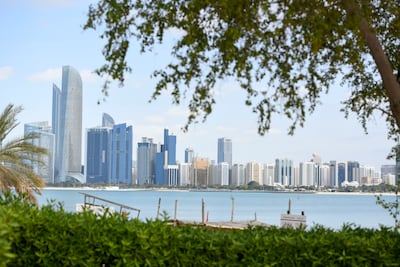The UAE has made significant progress in strengthening the country's regulatory and legislative framework since implementing the competition regulation law last year, the Ministry of Economy has said.
The Federal Decree-Law No 36 of 2023 has promoted fair competition, increased scrutiny of monopolistic trade practices in the Arab world's second-largest economy and helped in stemming anti-competitive activities, the ministry said in a media briefing this week.
The ministry co-ordinated with 14 federal and local government entities in the Emirates, Abdullah Ahmed Al Saleh, Undersecretary of the Ministry of Economy, said on Thursday.
The law, which has replaced earlier legislation of 2012, aims to maintain a competitive market “in line with the principle of economic freedom, by prohibiting agreements, conducts and acts that constitute abuse of a dominant position, monitoring all economic concentrations and avoiding any act that would distort, lessen, restrict or prevent free competition”, the ministry said.
Undersecretary of the Ministry of Economy
“This was to ensure the development of a modern, comprehensive legislation … ensuring consumer protection from anti-competitive practices … the promotion of economic efficiency, marketing and research and development are also key goals,” Mr Al Saleh said.
As the new law marks more than six months since its enactment, The National reviews its key objectives, the progress achieved so far and how it fares compared to other jurisdictions in the region.
Application of the law
The new law defines competition as the act of conducting economic activities without affecting or restricting market mechanisms, which could harm trade, development and consumer interests.
The new law applies to all businesses and people involved in economic activities, be it manufacturing or supplying of products and services. It covers head offices, branches and representative offices of businesses.
The law also extends to matters related to the exploitation of intellectual property rights inside and outside the UAE, such as licensing patents to third parties for manufacturing processes or franchising trademarks to global businesses.
It also covers economic activities conducted outside the Emirates that affect competition within the country, such as price-fixing agreements or exclusive supply contracts abroad that affect the availability of products and their pricing in the UAE.
Ministry of Economy said it is working to develop a more “agile and sustainable” competitive system, in line with the objectives outlined in the "We the UAE 2031" strategy.
Exclusion clause
The exclusion clause in the law exempts certain “agreements, practices, or conduct” related to specific goods or services.
If there is another law that deals with the rules and procedures for addressing anti-competitive practices and exemptions for a particular good or service, those rules will apply instead of the provisions of competition regulation law.
A sectoral regulatory agency such as a government body governing a particular sector is responsible for developing competition rules for those specific goods or services under its jurisdiction.
However, the agency can also request the Ministry of Economy to take over handling of anti-competitive practices and exemptions.
Exemption is granted to entities owned by the federal government, as determined by a Cabinet resolution based on the Minister of Economy's proposal and after co-ordination with the relevant authority, the law says.
And entities owned by an emirate's government, as determined by a resolution from the local government, are also excluded from the provisions of the law.
Which monopolistic practices are targeted by the new law?
The aim of the law is develop a “stimulating environment for enterprises” by curbing monopolistic practices, and addressing “all conditions that may undermine, limit, prevent or restrict competition”, Mr Al Saleh said.
Some of the most common examples of monopolistic practices include predatory pricing, exclusive supply agreements, and unfair pacts or mergers that hinder the entry of new players, according to law experts.
Predatory pricing refers to a business fixing prices extremely low, even below the cost of production to weed out competition. The violating business then raise prices, knowing that consumers will have fewer or no alternatives.
This progressive legislation by the UAE marks a “pivotal shift”, targeting competition practices and curtailing commercial monopolies, Aly Hegazy, managing partner at Dubai-based Justice Advocates and Legal Consultants, wrote in a recent note.
“[It] aims to cultivate a competitive business environment, prevent monopolistic practices, and enhance effectiveness and consumer welfare for establishments,” Mr Hegazy said.

Preventing mergers that harming competition
Law experts say businesses have welcomed the clarity provided by the defined turnover thresholds in the law.
It helped in understanding when merger activities will be subject to regulatory review, thus reducing uncertainty and facilitating in compliance planning.
“The UAE is seemingly aligning its framework with global best practices,” Alexandra Rogers, competition partner at Norton Rose Fulbright, told The National.
“Businesses will welcome increased certainty, for example through the introduction of turnover thresholds in merger control, and the additional guidance on the application of the new regime."
Turnover thresholds refer to specific financial yardsticks used to determine whether a merger or acquisition must be reviewed by competition authorities. These thresholds are typically based on the annual sales of the companies involved in the transaction.
Penalties and scope to appeal
Depending on the breach, fines may range from Dh100,000 ($27,246) to 10 per cent of the annual total sales of the company in question. However, if the annual total sales during the last fiscal year cannot be computed, the penalty will be Dh500,000 and goes up to Dh5 million.
The law allows stakeholders to file a written complaint about any decision within 15 working days of being notified of the decision.
Who enforces the law?
The competition regulation committee formed under the new regulation is responsible for setting policies for competition and enforcing provisions of the legislation.
“This indicates that the ministry is seeking to have a less dormant role in relation to anti-competitive practice in the UAE, and an increased oversight on the market,” global law firm Squire Patton Boggs said in an earlier note.

Some of the responsibilities assigned to the committee include proposing the general policy for protecting competition in the country and presenting it to the minister of economy to take action, the ministry said in a statement on Thursday.
It is also responsible for scrutinising issues related to the application of the provisions of this law and making recommendations to the minister.
Adding to the UAE’s global appeal
The new regulation has enhanced the UAE’s appeal as a prime destination for investment as it pushes innovation and efficiency, boosts investors’ confidence and ultimately benefits consumers through better products and services in the country, according to law experts.
Companies can now operate in a market where competition is based on merit rather than market dominance, said Byron James, a partner at the UAE law firm Expatriate Law.
partner at Expatriate Law
“By adopting a legal framework that aligns with international standards, the UAE is positioning itself as a leader in regulatory practices. This move is likely to attract both local and international investors, boosting economic growth and diversification,” Mr James told The National.
The introduction of this revamped competition regime is “protecting consumer interests and boosting UAE’s global competitiveness”, said Mariam Sabet, competition and anti-trust practice partner at law firm Al Tamimi & Company.
“Simply put, competition is a public good. In a competitive market, businesses are incentivised to innovate, improve their quality and ultimately provide buyers with more options,” Ms Sabet told The National.
“There is a growing global interest in what comes next and anticipation is high for the upcoming implementing regulations to this new competition regime and relevant cabinet decisions.”
How does the competition law compare to other jurisdictions?
Several Middle Eastern countries have already enacted or are in the process of updating their competition laws to align with international standards. The UAE's regulation is “notably more comprehensive and stringent”, Mr James said.
While Saudi Arabia, Kuwait, Oman, Jordan and Egypt have established their own competition laws, the UAE's legislation introduces more robust mechanisms for controlling economic concentration and preventing anti-competitive behaviour, he explained.
Economic concentration is the influence or control that a single business can wield over a market to serve its own interests and eliminate competition.
“Saudi's competition law, for example, shares the objective of preventing monopolistic practices and promoting fair competition. However, the UAE’s law offers more detailed provisions and stronger enforcement mechanisms,” Mr James said.
Similarly, Kuwait's competition protection law and Oman's law on the protection of competition and prevention of monopoly aim to create fair market conditions.
“The UAE's new law, however, sets itself apart by fostering greater collaboration between federal and local authorities, and enhancing the effectiveness of competition policy enforcement across the country,” Mr James added.


